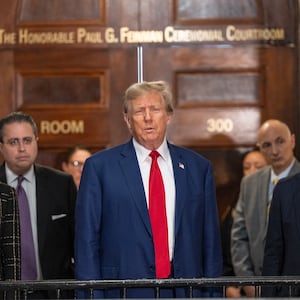The federal judge overseeing Donald Trump’s latest rape defamation trial in New York keeps cutting off attempts from the former president’s lawyers to veer into salacious topics that call into question the character of his accuser, E. Jean Carroll—keeping the arguments on a narrow track that seem to only lead in one direction: a punishing loss for the former president.
As the trial moves into its third day, Trump lawyer Alina Habba will continue to cross-examine Carroll, a long-time magazine advice columnist who already won a case against Trump last year when a previous jury found Trump liable for sexually assaulting Carroll in a Manhattan department store. The journalist is now trying to prove to what extent he trashed her reputation when he misused the global reach of his official presidential voice in 2019 by denying they ever met. Nine jurors selected on Tuesday are merely deciding on damages.
But Habba is running into serious problems, as U.S. District Judge Lewis Kaplan keeps interrupting her questions, lecturing her in a condescending tone and forbidding her from approaching just about any subject that would hint at wrongdoing by Carroll.
Habba has been blocked from exploring whether there are serious repercussions for Carroll deleting evidence of the supposedly numerous death threats she received after initially coming forward about the attack or owning a gun in the heavily regulated New York state without a license. The judge has also limited the extent to which Habba can explore the nature of what she downplays as “mean tweets” that have relentlessly followed Carroll for four years now, as well as Carroll’s decision to never report any alleged threats to her local police.
Trump himself touched on some of this late last night, taking to his Truth Social media network to call on the judge to chuck out the entire case—a tall order that has zero basis in reality.
“Now that E. Jean Carroll has admitted to illegally deleting and destroying mountains of evidence (as well as, it seems, unlawfully owning a gun and buying ammunition!), if Judge Lewis Kaplan does the right and PATRIOTIC thing, he will immediately dismiss the current Election Interfering Witch Hunt Trial,” Trump wrote, continuing on with nonsense claiming that the trial was somehow connected to President Joe Biden.
In reality, Trump brought the lawsuit on himself by falsely denying that he ever encountered Carroll (which a jury has already ruled that he did) and hiding for years behind presidential immunity afforded to the highest government official in the land, only to finally face this defamation trial after a jury already slapped him with a $5 million fine last year.
But in court, Judge Kaplan’s increasingly stringent approach to Trump and his lawyers may risk fueling notions that the judicial system has it out for the billionaire tycoon.
While Kaplan’s threats to eject Trump from the building on Wednesday appeared proportional to Trump’s repeated outbursts in the courtroom, the way he has incessantly patronized Trump’s lawyer over minor grammatical errors has seemed heavy-handed.
More important than grammar notes, however, is the way Kaplan has kept the trial barreling toward an inevitable conclusion: Trump paying for his insults.
After all, the former president is on trial over disparaging comments he made in June 2019—ones he continued unabated after clearly losing the first trial in May 2023 and keeps making as he’s on trial this week.
In court, Kaplan keeps steering the wheel by cutting off Habba anytime she approaches what jurors might consider the spiciest issues. To prove how badly she’s been affected by Trump’s insults and the wave of hate she’s been subjected to by MAGA loyalists, Carroll has detailed the fear and how she’s responded to that perceived terror. And yet Habba is having trouble exploring some of what might back that up.
For example, Carroll testified under oath that she now sleeps next to a nine-chamber, .22-caliber revolver she inherited from her father. To the jury, it was meant to be evidence of the absolute despair this left-leaning, urbanite felt after getting inundated with threats. But when Habba tried to show that Carroll possibly broke New York’s extremely stringent firearms restrictions by owning that gun without prior state approval, the judge immediately silenced her.
“You live in this state. I don't want you to give me your address, but you live in this state, don't you, Ms. Carroll?” Habba asked.
“I live in this state, yes,” Carroll responded.
“Are you aware you need a license—” Habba began, before the judge cut her off and warned her to not speak another word of the matter.
His interjection is now found nowhere in the court transcript, as if it never happened, because the judge ordered it stricken from the official record.
The judge similarly stopped Habba in her tracks when the New Jersey lawyer probed why Carroll couldn’t back up her claims that she’d been inundated with death threats in the days after she initially came forward in June 2019 about the sexual assault. Answering questions about what Carroll called a “wave of slime,” the writer explained that she kept deleting emails and other incoming electronic messages for years—even after she had sued Trump and would have had some kind of obligation to keep those kinds of receipts.
“Do you control your e-mail? Does anybody else control your e-mail?” Habba asked.
“Nobody,” Carroll answered.
“Would anybody else have deleted the messages after we were in active litigation?” Habba continued.
“I don't think they would,” Carroll said.
“So only you could have done that, is that correct?” the lawyer queried.
“Yes,” Carroll acknowledged.
At that, Habba’s tone turned acerbic: “Ms. Carroll, are you aware that it is illegal to delete evidence after a subpoena has been issued?”
But then Carroll’s lawyer, Roberta Kaplan, objected—and the judge ordered the jury to “disregard” Habba’s question.
The federal judge then turned his attention to Habba and reprimanded her. “You're not instructing the jury, counsel,” Judge Kaplan said.
“I was not going to,” she began. “Your Honor, at this moment, I feel I have to ask for a mistrial. The witness has just admitted to deleting evidence herself, which are part of her claim of damages, and I haven't seen them. She has no evidence of them. She hasn't turned them over.”
“Denied,” he shot back. “The jury will disregard everything Ms. Habba just said.”
That kind of tit-for-tat went on all afternoon. And it’s set to continue Thursday, as Habba wraps up her cross-examination of Carroll. The trial is expected to end soon—possibly even by early next week—given the limited number of witnesses.








